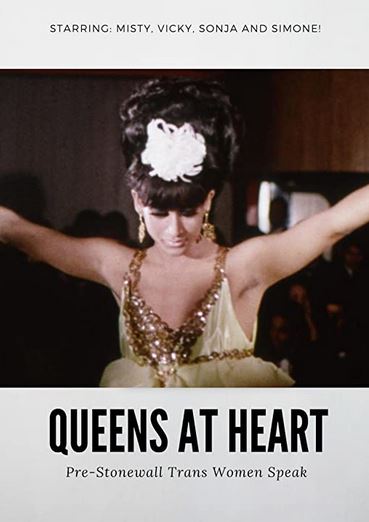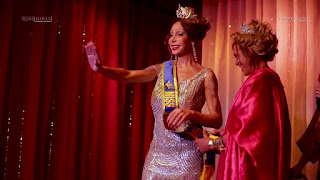Release Year: 2017
Original title: Luana Muniz: Filha da lua
Synopsis:
"Luana Muniz: Filha da Lua" (2017) is a compelling documentary directed by Rian Córdova and Leonardo Menezes that delves into the multifaceted life of Luana Muniz, a transgender activist, actress, and cabaret performer known as the "Queen of Lapa". This documentary, which spans 78 minutes, takes a close look at her profound impact on the LGBTQIA+ community in Rio de Janeiro, her involvement in sex work, and her tireless activism on behalf of transgender individuals.
The film doesn’t just recount her life, it portrays the complexities of her persona, exploring her roles as a protector, a leader, and a fierce defender of marginalized communities.
Luana Muniz was a trailblazer for transgender rights and a strong advocate for sex workers. In 2002, she founded the "Associação dos Profissionais do Sexo do Gênero Travesti, Transexuais e Transformistas do Rio de Janeiro" (Association of Transgender, Transexual, and Transvestite Sex Workers of Rio de Janeiro), a pivotal organization focused on securing better rights and recognition for sex workers in the city. Additionally, she created a safe space for transgender individuals by establishing a hostel in Lapa that offered shelter to trans sex workers, providing them a safer place to live and work. She also co-founded the "Damas Project", which focused on training transgender people for employment opportunities and providing them with vital skills to succeed in the labor force.
The film, which won several awards—including Best Feature Film at the Rio Gender and Sexuality Festival, the People's Choice Award at MixBrasil Festival, and the Best Documentary Feature at the DIGO Festival of Sexual Diversity and Gender—was lauded for its honest portrayal of Muniz's life. It highlights her multifaceted identity, showing her not just as a sex worker or activist, but as an artist and a figure of immense charisma. The film is both a tribute and a reflection on the lasting legacy she left on her community and the LGBTQIA+ movement.
The documentary goes beyond the typical posthumous film by embracing the complexity of Muniz’s character. It doesn’t paint her as a saint, nor does it romanticize her struggles. Instead, it offers a grounded, almost journalistic perspective on her life, avoiding embellishment and focusing on factual accounts from a range of interviews. These interviews, which include people who were part of her life, provide a rich tapestry of stories that illustrate her vibrant personality and her activism.
Muniz's fame grew significantly in the early 2000s, especially after a famous incident in which she publicly confronted a client during a "Profissão Repórter" television segment, shouting "Travesti não é bagunça" ("Transgender people are not a joke"). This powerful statement became a viral catchphrase, cementing Muniz as an outspoken figure in the fight for transgender rights in Brazil. However, the film reveals much more about Muniz, showing her as a leader who fostered a sense of community in Lapa and a fierce protector of the vulnerable. The documentary captures her as a strong, resilient woman who was unafraid to speak her truth, offering a deep dive into the struggles and triumphs of her life.
Rather than taking a traditional biographical approach, the directors chose to focus on the emotional and historical significance of Muniz’s work. Interviews with various people—ranging from close friends and collaborators to former sex workers she helped—are skillfully woven together to show the vast impact she had on those around her. The film is carefully constructed, revealing different facets of Muniz's life and work as it moves through her personal and professional milestones.
A significant part of the documentary highlights Muniz's role as a mother figure to the LGBTQIA+ community. The "Casarão Rosa", a large pink building in Lapa that she owned, became a sanctuary for sex workers, people living with HIV, LGBTQIA+ individuals, and the homeless. It was in this space that Muniz became a maternal figure to many, offering not just shelter, but also a sense of belonging to those who had nowhere else to go. This theme of collective care and camaraderie runs through the film, providing a glimpse into how Muniz’s work transcended activism, becoming a life raft for people in need.
In the documentary, the presence of key figures such as singer Alcione—who supported Muniz's projects—helps to reinforce the emotional depth of the narrative. Alcione’s brief but poignant remarks about Muniz show just how deeply she touched the lives of those around her. Muniz’s friends, like "Claudette Colbert" and "Lorna Washington", also provide insight into her character, each sharing their unique perspectives on the woman who was not only an entertainer but a symbol of strength for the marginalized.
Despite the film's focus on Luana’s life, there is an undercurrent of sorrow woven through the documentary as the directors address Muniz's passing in 2017. She died from a heart attack at the age of 58, leaving behind a legacy of advocacy and protection for those who needed it most. The filmmakers capture her funeral and the reactions of those who mourned her, underscoring the lasting impact she had on the community. It’s through these moments that viewers come to understand just how deeply Luana’s spirit endures, not only in the stories of those she helped, but also in the memory of her friends and colleagues who continue to honor her legacy.
What stands out in "Luana Muniz: Filha da Lua" is its refusal to make the documentary solely about her death. The film does not succumb to melodrama; rather, it focuses on the living legacy of Muniz, exploring how her work continues to resonate within the LGBTQIA+ community in Rio and beyond. Whether through the graffiti that adorns the streets of Lapa bearing her iconic phrases or the stories told by the people she touched, her presence is far from gone. As one of her close friends notes in the film, “Luana was… no, Luana "is" still with us.” This powerful statement reinforces the idea that even in death, Luana’s influence remains ever-present.
In its essence, "Luana Muniz: Filha da Lua" is more than just a documentary. It’s a celebration of an extraordinary woman whose life was defined by her advocacy, her artistry, and her unapologetic defiance in the face of oppression. By presenting her in all her complexity—strong, tender, fierce, and compassionate—the film captures the essence of a woman who fought for justice while embracing the challenges that life threw her way. The documentary stands as a tribute to her resilience, her vision for a better world, and her unshakable belief that transgender people, and all marginalized groups, deserve respect and equality.
The lasting legacy of Luana Muniz is etched in the hearts of those she fought for, and through the film, her story continues to inspire future generations to challenge societal norms and fight for the rights of the most vulnerable.
via: youtube
Image credits: YouTube





.jpg)

.jpg)













Post a Comment